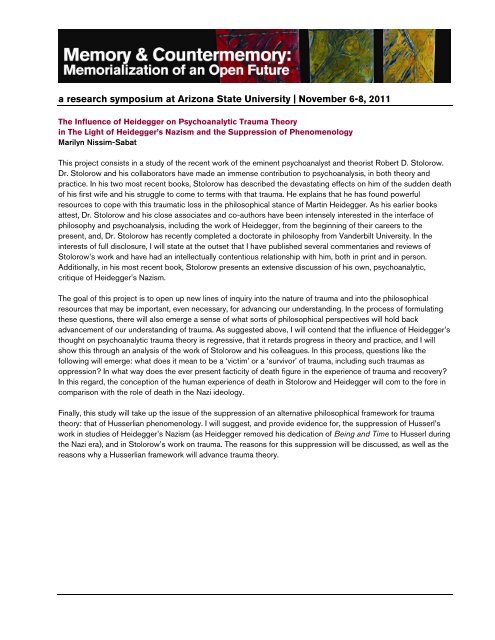Symposium Program (printable PDF) - ASU Jewish Studies
Symposium Program (printable PDF) - ASU Jewish Studies
Symposium Program (printable PDF) - ASU Jewish Studies
You also want an ePaper? Increase the reach of your titles
YUMPU automatically turns print PDFs into web optimized ePapers that Google loves.
a research symposium at Arizona State University | November 6-8, 2011The Influence of Heidegger on Psychoanalytic Trauma Theoryin The Light of Heidegger’s Nazism and the Suppression of PhenomenologyMarilyn Nissim-SabatThis project consists in a study of the recent work of the eminent psychoanalyst and theorist Robert D. Stolorow.Dr. Stolorow and his collaborators have made an immense contribution to psychoanalysis, in both theory andpractice. In his two most recent books, Stolorow has described the devastating effects on him of the sudden deathof his first wife and his struggle to come to terms with that trauma. He explains that he has found powerfulresources to cope with this traumatic loss in the philosophical stance of Martin Heidegger. As his earlier booksattest, Dr. Stolorow and his close associates and co-authors have been intensely interested in the interface ofphilosophy and psychoanalysis, including the work of Heidegger, from the beginning of their careers to thepresent, and, Dr. Stolorow has recently completed a doctorate in philosophy from Vanderbilt University. In theinterests of full disclosure, I will state at the outset that I have published several commentaries and reviews ofStolorow’s work and have had an intellectually contentious relationship with him, both in print and in person.Additionally, in his most recent book, Stolorow presents an extensive discussion of his own, psychoanalytic,critique of Heidegger’s Nazism.The goal of this project is to open up new lines of inquiry into the nature of trauma and into the philosophicalresources that may be important, even necessary, for advancing our understanding. In the process of formulatingthese questions, there will also emerge a sense of what sorts of philosophical perspectives will hold backadvancement of our understanding of trauma. As suggested above, I will contend that the influence of Heidegger’sthought on psychoanalytic trauma theory is regressive, that it retards progress in theory and practice, and I willshow this through an analysis of the work of Stolorow and his colleagues. In this process, questions like thefollowing will emerge: what does it mean to be a ‘victim’ or a ‘survivor’ of trauma, including such traumas asoppression? In what way does the ever present facticity of death figure in the experience of trauma and recovery?In this regard, the conception of the human experience of death in Stolorow and Heidegger will com to the fore incomparison with the role of death in the Nazi ideology.Finally, this study will take up the issue of the suppression of an alternative philosophical framework for traumatheory: that of Husserlian phenomenology. I will suggest, and provide evidence for, the suppression of Husserl’swork in studies of Heidegger’s Nazism (as Heidegger removed his dedication of Being and Time to Husserl duringthe Nazi era), and in Stolorow’s work on trauma. The reasons for this suppression will be discussed, as well as thereasons why a Husserlian framework will advance trauma theory.


